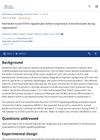2 citations,
September 2014 in “Nature reviews. Drug discover/Nature reviews. Drug discovery” Specific immune cells cause alopecia areata and blocking certain proteins can prevent it.
 4 citations,
July 2013 in “Journal of Dermatological Science”
4 citations,
July 2013 in “Journal of Dermatological Science” Pregnancy right after giving birth in mice lacking IL-10 causes milk that leads to liver issues and hair loss in their babies.
March 2020 in “The Egyptian Journal of Histology” Topical olive oil protects mice skin from harmful electromagnetic radiation.
 123 citations,
September 1987 in “JAMA”
123 citations,
September 1987 in “JAMA” IL-2 treatment causes skin eruptions and other reversible side effects, and may play a role in psoriasis.
 32 citations,
July 2012 in “Stem Cells Translational Medicine”
32 citations,
July 2012 in “Stem Cells Translational Medicine” Vitamin D3 can help improve hair growth by enhancing the function of specific skin cells and could be useful in hair regeneration treatments.
 25 citations,
July 1994 in “Archives of Dermatology”
25 citations,
July 1994 in “Archives of Dermatology” A man's skin condition, pemphigus vulgaris, came back after he was treated with interleukin 2 for cancer.
 11 citations,
March 2013 in “Gene”
11 citations,
March 2013 in “Gene” A certain genetic variation in the IL1A gene may lower the risk of a hair loss condition in Chinese people.
 3 citations,
May 2020 in “JAAD Case Reports”
3 citations,
May 2020 in “JAAD Case Reports” Two patients with psoriasis grew extra hair after using certain psoriasis medications.
 October 2024 in “South Eastern European Journal of Public Health”
October 2024 in “South Eastern European Journal of Public Health” A 3-month treatment improved PCOS symptoms and reduced certain immune proteins.
 October 2021 in “Dermatology Reports”
October 2021 in “Dermatology Reports” Higher IL-17A levels indicate more severe alopecia areata.
 12 citations,
May 2018 in “JAAD Case Reports”
12 citations,
May 2018 in “JAAD Case Reports” A man's gray hair got darker and thicker after using a psoriasis drug.
 14 citations,
October 2000 in “Genomics”
14 citations,
October 2000 in “Genomics” Rat dermal papilla cells have unique genes crucial for hair growth.
 1 citations,
April 2024 in “Journal of Autoimmunity”
1 citations,
April 2024 in “Journal of Autoimmunity” Interleukin-15 can help hair growth and protect hair follicles.
90 citations,
February 2001 in “The journal of investigative dermatology/Journal of investigative dermatology” Interleukin-1 increases keratin K6 production in skin cells.
42 citations,
July 2013 in “Gene” IL-4 gene variation may increase the risk of alopecia areata in Turkish people.
22 citations,
January 2014 in “Journal of Interferon & Cytokine Research” Certain genetic variations in IL18 may increase the risk of alopecia areata in Koreans.
 16 citations,
January 2018 in “International Journal of Trichology”
16 citations,
January 2018 in “International Journal of Trichology” Minoxidil may help treat hair loss by reducing inflammation-related gene activity in skin cells.
14 citations,
November 2019 in “Mediators of inflammation” IL-6 from stem cells helps repair skin and grow hair.
12 citations,
January 2018 in “Journal of Clinical Laboratory Analysis” Certain IL-18 gene variations may increase the risk of alopecia areata.
 11 citations,
November 2015 in “Experimental Dermatology”
11 citations,
November 2015 in “Experimental Dermatology” The conclusion is that the IL-6/STAT3 activation affects p63 expression in healing wounds, which may help in hair follicle regeneration.
 7 citations,
February 2023 in “Inflammation and Regeneration”
7 citations,
February 2023 in “Inflammation and Regeneration” The protein interleukin-1 alpha helps regenerate hair follicles and increase stem cell growth in mice.
 3 citations,
May 2017 in “Heliyon”
3 citations,
May 2017 in “Heliyon” Wound healing can help prevent hair loss from chemotherapy in young rats by increasing interleukin-1β signaling.
 October 2021 in “Turkderm”
October 2021 in “Turkderm” Hormonal imbalances, not insulin resistance or dyslipidemia, may be more important in causing acne in women over 25.
 7 citations,
September 2020 in “Frontiers in Cell and Developmental Biology”
7 citations,
September 2020 in “Frontiers in Cell and Developmental Biology” IL-36α helps grow new hair follicles and speeds up wound healing.
 October 2010 in “Journal of Men's Health”
October 2010 in “Journal of Men's Health” Larger prostate size in older men may be linked to poorer semen quality and fertility issues.
 May 2004 in “International Journal of Cosmetic Science”
May 2004 in “International Journal of Cosmetic Science” Melanogenesis inhibitors like kojic acid and niacinamide can reduce inflammation and pigment production in skin cells.
 127 citations,
January 2013 in “PLOS ONE”
127 citations,
January 2013 in “PLOS ONE” Probiotic bacteria improved skin and hair health in aged mice.
 32 citations,
January 2006 in “Acta dermato-venereologica”
32 citations,
January 2006 in “Acta dermato-venereologica” SACUMAN, a rare condition causing hair loss without clear signs, is often misdiagnosed and needs scalp biopsies for accurate detection.
 11 citations,
June 1996 in “Nutrition”
11 citations,
June 1996 in “Nutrition” Vitamin D3 may prevent hair loss from chemotherapy, but side effects and cancer cell protection are concerns.
 9 citations,
April 2016 in “Australasian journal of dermatology”
9 citations,
April 2016 in “Australasian journal of dermatology” Combining imiquimod with diphenylcyclopropenone may improve treatment outcomes for alopecia areata patients who don't respond to diphenylcyclopropenone alone.






















